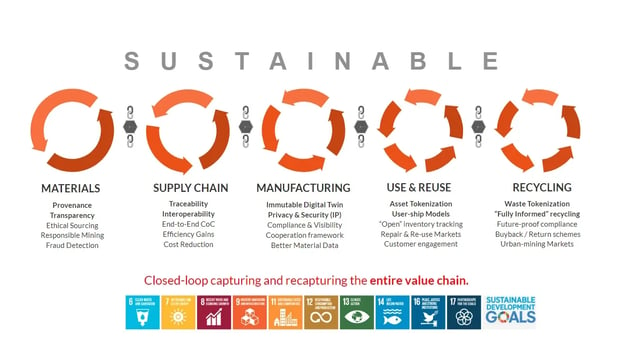Blockchain technology enables us to digitize and streamline the supply chain workflows to improve efficiency, reduce costs and improve management of resources, compliance and risks.
What are the current Supply Chain Challenges?
As trade expands globally, supply chains continue to evolve from a linear structure into something that looks more like a web – full of checkpoints and dependencies between segregated processes and systems that need to be integrated in order to function efficiently.
Software solutions such as ERP systems are widely available – with matured integration frameworks. Cloud computing infrastructure and internet connectivity is cheaper and more accessible than ever. Yet, despite all of this, effective end-to-end Supply Chain management remains an extraordinarily complex challenge, especially in the following areas:
Traceability
Chain-of-custody is derived based on evidence drawn from many different sources – making it difficult to streamline the process end-to-end.
Compliance
Gathering data to prove the full backstory of products and materials in a given supply chain is a challenging and costly task.
Efficiency
Integrating multiple siloed systems requires more systems to be built and maintained which increases the complexity of the entire supply chain “infrastructure”.
Speed & Cost
Intermediation is required to handle disputes, inaccuracies or suspected fraud and corruption. This slows down the supply chain processes whilst increasing risk and overall cost.
The case for Blockchain in the Supply Chain
Can a secure, time-stamped and tamper-proof ledger, distributed across multiple entities, help us improve Supply Chain Management? Recent analysis by Deloitte, PwC, KPMG, and Accenture all point to a positive answer. Blockchain can enable us to digitize and streamline the supply chain workflows – from the raw material sourcing right up to the recycling phase – in such a way that many inefficient and time-consuming steps are no longer required.
%20(1)%20(1).webp?width=487&height=274&name=Blockchain-For-Circular-Economy%20(1)%20(1)%20(1).webp)
Supply chain management is viewed as one of the most promising applications of blockchain, with a number of enterprise blockchain initiatives currently in the proof-of-concept or pilot phases.
A survey from Deloitte shows that the vast majority (74%) of the more than 1,000 interviewed executives either already participate in or will likely join a blockchain consortium. The 2018 Gartner IT Forecast predicts that by 2025 blockchain will create US $176B in business value and US $3.1T by 2030.
Blockchain for Circular Economy
Blockchain initiatives are leading to the formation of numerous partnerships and consortia in almost every industry. Start-ups, NGOs, government agencies, enterprises and academics are utilising the technology to solve issues that extend beyond the interests or capacity of any single entity.
We can think of supply chains as networks of participants who share certain:
- Interests
- Benefits
- Risks
- Responsibilities
As they engage in trade which includes the exchange of:
- Assets
- Value
- Information
Whilst agreeing to adhere to certain:
- Regulations
- Rules
- Standards
- Codes of Practice
Fully digitizing a supply chain requires consideration of all of these stakeholder interests and relationships. By incorporating blockchain technology into the digitization process and having all parties participate in the same system, not only is efficiency improved and costs reduced, but the supply chain can easily move from being a linear one to a digital circular economy. With more accurate information at each stakeholder’s fingertips, there are opportunities for improved management of resources, compliance and risk, and the social and environmental impact of production and supply can also be accounted for.
CircularTree is tackling E-Waste
When we are collectively throwing away a pile of e-waste the size of 4,500 Eiffel Towers and containing USD $60+ billion worth of retrievable resources annually (source: e-waste monitor), it’s clear from both a financial and environmental point of view that we are wasting a huge opportunity. Given the commercial need for traceability of raw or source materials for products, plus regulatory and consumer imperatives that are shifting the onus for dealing with waste onto the organisations that created it to start with, it’s vital for all participants involved to share the common digital infrastructure to be able to collaborate systematically.
Hazardous or not?
A major hurdle in the recycling of e-waste is that devices may or may not contain hazardous materials or other hard-to-recycle components, and this information is not available to end users or waste contractors. Manufacturers need to deal with the paradox of having to disclose information on hazardous components whilst protecting confidential business information – their intellectual property. And even from the very beginning, a device may contain materials sourced problematically – e.g. by slave labour, or from conflict zones- and with little information provided by manufacturers as to the exact composition of electronic device components.
HazChain – A disrupting platform for e-waste recycling
CircularTree is aiming to change this, developing a platform with a transactional ledger for e-waste recycling – connecting parties involved in the recycling supply chain and increasing efficiencies. HazChain will provide immediate data on recycling to policy makers, leading to improved resource efficiency and expenditure.
Together with other organisations, government bodies, and individuals, CircularTree wants to not just deliver a more efficient process, but to actuate real change in the way we view sustainability and the management of e-waste, both locally and globally.







